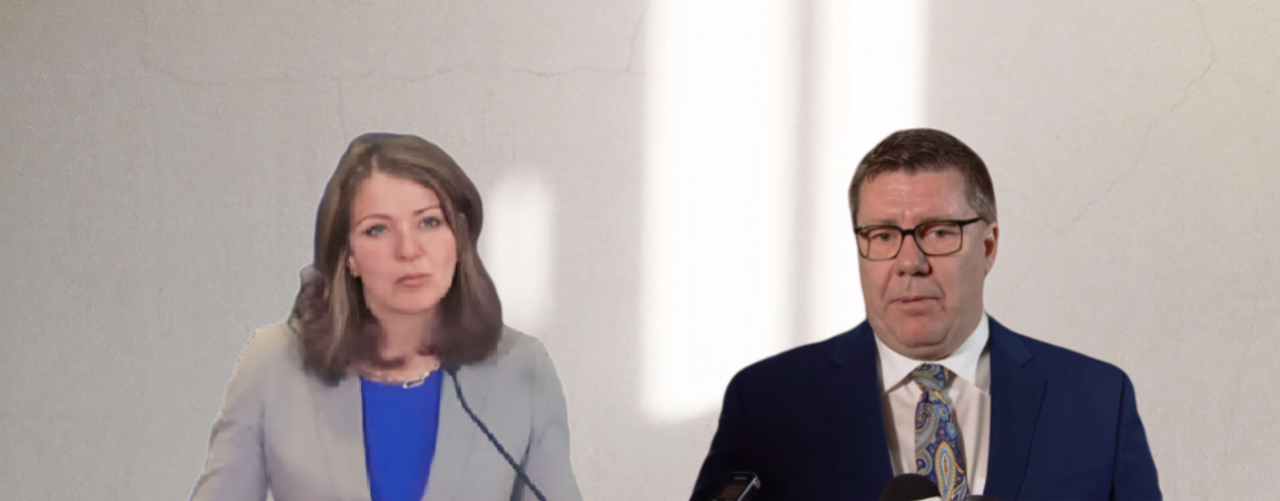Alberta Premier Danielle Smith and Saskatchewan Premier Scott Moe held a joint press conference in the border city of Lloydminster, addressing key topics concerning energy policies, carbon capture, and federal relations. The conversation took place amid growing discussions around carbon capture technologies and the role of provincial governments in energy production and environmental initiatives.
A significant portion of the press conference revolved around the utilization of carbon dioxide (CO2) for enhanced oil recovery (EOR) and the contrasting perspectives between the provinces and the federal government. Saskatchewan has been a pioneer in using CO2 for EOR since 2000. Alberta has also made significant strides in carbon capture and storage, with projects like Shell Quest and the Alberta Carbon Trunk Line sequestering over 11.5 million tonnes of CO2.
However, Premier Smith expressed frustration over federal policies that limit the use of CO2 for enhanced oil recovery. She noted that the federal government’s carbon capture credit program does not allow the use of CO2 for EOR, even though it is a productive way to reduce emissions and enhance oil production.
“We’ve brought in a credit that allows for CO2 to be used for enhanced oil recovery, and we will continue to engage with the federal government to get them to be reasonable about it,” Smith said. She emphasized that CO2 utilization could both lower emissions and create revenue, something the provinces believe is crucial for balancing environmental goals with economic needs.
Premier Moe echoed these sentiments, criticizing the federal government for missing a valuable opportunity. “It’s really quite a travesty that there isn’t at least a split rate on how CO2 is used,” Moe said, referencing how the U.S. offers different rates for CO2 storage versus its use in enhanced oil recovery. This, he argued, leaves Canadian industries at a competitive disadvantage compared to their American counterparts.
Moe also highlighted a unique situation in Saskatchewan, where companies are importing CO2 from the United States to use in enhanced oil recovery due to insufficient domestic supply. “We are sequestering not only our Canadian CO2 but also American CO2,” he remarked, pointing to the Boundary Dam project as an example of cross-border cooperation.
The premiers stressed that both Alberta and Saskatchewan are committed to finding innovative solutions that reduce emissions while maintaining economic growth. In particular, Moe spoke about Saskatchewan’s commitment to expanding oil production in a sustainable manner. He described his government’s “growth target” of increasing oil production as an essential part of delivering “the most sustainable and ethical product that you can find on Earth.”
Premier Smith discussed Alberta’s efforts to expand existing pipeline capacities rather than pushing for new projects. She highlighted Alberta’s ability to increase oil exports without necessarily constructing new pipelines, thanks to current innovations and expansions in compression and looping systems. “We already have the ability to increase our egress capacity. We’ve been told we can move as much as six million barrels per day, even though we’re currently at four million barrels per day,” Smith said, indicating that Alberta’s energy future might not solely depend on new infrastructure.
The press conference also ventured into the often-contentious territory of federal-provincial relations. Both premiers took issue with the federal government’s handling of energy policies and regulations. Moe suggested that Ottawa’s unwillingness to allow CO2 usage for EOR might reflect broader goals of phasing out oil and gas production in Canada. “It concerns me that there’s another policy outcome they’re trying to achieve,” he said, referring to what he believes is a federal strategy to transition away from fossil fuels altogether.
Smith similarly criticized the federal government’s approach, specifically targeting Bill C-69, which has been dubbed the “No More Pipelines Act” by critics. Alberta has launched a legal challenge against the bill, arguing that it creates an unworkable regulatory environment for energy projects. Smith stated that a new regulatory framework is needed, one that ensures confidence in project timelines and completion.
Despite these challenges, both premiers remained optimistic about the future. Smith expressed confidence in Alberta’s ability to maintain a strong relationship with the United States regardless of political shifts in Washington. “Whether it’s a Republican or Democrat White House, Alberta will have a great relationship with America,” she said. However, she noted that discussions might differ depending on who is in power, with Republicans likely more receptive to restarting conversations about the Keystone XL pipeline, while Democrats might focus more on natural gas and hydrogen exports.
The press conference briefly turned to the issue of ethics in governance, as Premier Smith was asked about members of her cabinet accepting hockey playoff tickets. Smith confirmed that she had accepted tickets herself but was unaware of how many other ministers had done so. She emphasized that all members were required to report gifts and tickets to the Ethics Commissioner. “They don’t report to me, they report to the Ethics Commissioner, and I expect them to follow the rules,” Smith said.
The press conference highlighted the ongoing challenges and opportunities facing Alberta and Saskatchewan as they navigate federal policies and global energy markets. Both premiers underscored the need for balanced approaches that support economic growth, energy security, and environmental sustainability. As the federal government and provinces continue to debate the future of carbon capture and oil production, the outcomes will have significant implications for Canada’s role in global energy markets and its path toward meeting climate goals.

